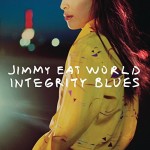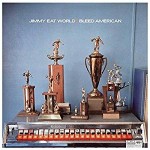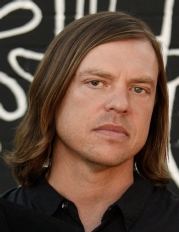Jimmy Eat World has been cranking it up for over two decades, giving us at least two classic emo albums – 1999’s Clarity and 2001’s Bleed American – and hit songs including “Pain”, “Big Casino”, “My Best Theory”, and the biggest of them all – “The Middle”. They just released a new album called Integrity Blues.
This interview with bassist Rick Burch, who has been with Jimmy Eat World since 1995, was for a preview article for noozhawk.com for the Jimmy Eat World concert at the Majestic Ventura Theater on 10/28/16. It was done by phone on 9/29/16, the day that the band performed on The Late Show with Stephen Colbert. (Jimi Giannatti photo)
Jeff Moehlis: I understand that you’re in New York City to play on The Late Show with Stephen Colbert later today. What’s it like to get ready for a big performance like that?
Rick Burch: It’s really exciting. Getting ready started months ago, just with rehearsals at home and gaining our proficiency for performing the song. That really gives us the foundation for today, when it’s like, “Alright, we’re doing this in front of cameras live to the nation.” There’s a bit of nerves, you know, and it’s really exciting because we get to share the new music with the world. But being confident from rehearsing at home and just going through soundcheck making sure… We just did a soundcheck to make sure everything is working properly, and sounding good to us. Just doing it. It’s interesting. They invite us to come perform, so we realized that they’re inviting us to do our thing, so we just come and do our thing and have fun.
JM: What can people look forward to at the upcoming show in Santa Barbara?
RB: We’re super excited for the upcoming gig, mainly because we’re going to be performing some of the new material from Integrity Blues, which we’re really excited about. We worked really hard to bring it together and make this album, and we’re really proud of it, and really looking forward to performing it live.
That’s like the next phase of doing albums. You make the album – you record it – and then you get to go out and perform it live. It’s nice. When you’re recording, it’s just us in the room with the producer. So we’re kind of satisfying ourselves, making the songs sound and be exciting for us. And then, it’s an entirely other thing to perform them live and get the perspective of other people. You can see the reactions on people’s faces immediately as you’re going through the tunes. It’s really fun. We’re just really looking forward to it.
JM: I really like the new album. There’s seems to be a certain maturity to it, but you guys still rock out. There’s the song “Get Right” that’s already been released on YouTube, and I love the riff at the end of “Pass the Baby”.
RB: [laughs] Yeah, for sure. That one was super fun.
JM: How do you see this new album fitting in with the rest of the catalog?

RB: Integrity Blues is an album that we feel is a current snapshot of Jimmy Eat World, right now. That current snapshot wouldn’t be what it is without the previous albums. As you progress through – we’ve been a band 22 years – we’re always learning and we’re always adding to our toolbox. For Integrity Blues, definitely we’re using all that we have, and really giving it all we’ve got.
And also, in making the album, we challenged ourselves to take new approaches to musical situations that present themselves when you’re writing music. So we wanted to be aware of conventions we had used in the past, and then try something new, just in an effort to progress and grow. And that’s kind of a theme of the album as well, lyrically. It’s about enjoying the journey, and not being so focused on the end product. If you focus too much on your goal, you might miss out on a lot of the good things that you have right now along the journey to reach that goal.
JM: I want to ask you about some of the older stuff, first the Clarity album, which is now viewed as a landmark album. How was the band’s approach to that album different from the one that came before it, Static Prevails?
RB: Static Prevails was the first record we had done with a major label, and that was just like getting a glimpse into how to build an album on that level. We had never done it before, so it was kind of just like, “Whoa.” It’s a big process that we didn’t know anything about before Static Prevails.

Coming into making Clarity, the band hadn’t been together for a long time. We didn’t know how long we would be doing this on a professional level, so we just wanted to throw everything at it. We were in these incredible studios in Los Angeles, and so we were like, “Let’s rent tympani drums. Let’s go for it. If we have an idea, let’s do it.” It was extremely fun, and we just had the approach of, “We might not be doing this ever again. This might be our last chance. So let’s go for it.” Which was different from Static Prevails. Static Prevails was kind of like, “OK, we have these songs. Let’s record them”, not really aware of the what was possible in the studio. And so Clarity was like finding out what’s possible in the studio.

JM: A couple of years later you guys released Bleed American, which is now 15 years old. What are your reflections on that album?
RB: It was really cool making Bleed American because we had gotten out of our contract with Capitol Records after touring for Clarity, which was a great thing in our opinion. It was a very freeing thing, so we just felt really free. We were just four dudes in a band, and we wanted to make music. And that’s another thing that’s always been the case all along, with every album – we just love making music and playing music. We really appreciate the opportunity that we have to do that.
So making Bleed American, we weren’t working with any label. It was just us in the studio with Mark Trombino, having fun and making music that excited us. It wasn’t until after the album was made that we signed with DreamWorks Records, who we put the album out with. It was incredible meeting them, and becoming a part of that team. It was a really wonderful place. They’re not around anymore, but it was a very creative environment. They really focused on the artists, and helping the artists facilitate their ideas.
JM: That album had the huge hit song “The Middle”. How did that song come together?
RB: When making Bleed American, we just had this group of songs that we were excited about. So we really had no idea which, if any, would connect with the public audience. We had no idea it would have such a connection with people. But looking back on it, it absolutely has that potential, in that the song is about something that I think everyone goes through in their lives, that moment or time when you feel like people don’t understand you, and you feel like the world’s against you and they just don’t get what you’re about. It’s just a song saying, “Hey, don’t worry about them. You’re going to continue on, and it’s going to be better.”
JM: Was shooting the video for that song as much fun as it looks?
RB: Absolutely [laughs]. We shot that video in Arizona. The film company found a house that was taken off the market, so it was a vacant house that was slated to be demolished. So they said, “Hey, you guys can do whatever you want in here. You can bust through walls – whatever you want to do.” So it pretty much gave the director open reign.
His idea was taking kind of the reverse on the dream that some of us have, where you’re in a public situation and you’re in your underwear, and everyone else is looking at you weird, like “Why are you the weirdo in your underwear?” It took that and flipped it, so the normal was everyone’s in their underwear, and then there’s the two characters that are in their clothes, and everyone’s looking at them weird like they don’t belong.
So yes, we’re in this house. It was the summertime in Arizona, and there was no power at it so there was no air conditioning. Imagine a day like today for you in Santa Barbara – it’s really hot, and you’re in an old house that has no power, and everyone’s in their underwear, sweaty and dancing and having fun. It was a really unique experience, and really cool. It was a lot of fun.
JM: Do you think the term “emo” was a good label for what you guys were doing then? How did you view being labeled that way?
RB: We felt it was unfair to music in general, because all music is emotional. So we found it kind of silly that you call this one style of music or whatever “emotional”. It kind of shortchanges the rest of music. We didn’t really embrace it, but it really didn’t offend us either because the music is emotional, just like all other music. It’s just one of those things – people like to have a tag that they can pin on things. That’s really all we viewed it as.
JM: What advice would you give to an aspiring musician?
RB: Just do things that make you happy, and have fun at what you’re doing. Don’t really worry too much, or try to satisfy other people so much. Just make sure that you’re happy with and proud of the music that you create. And again, pay attention to where you are. The journey is the destination. And have fun.
JM: You guys are playing on Colbert, you have an album coming out, and a tour. Are there any other cool things in the works? Or will all that be keeping you busy?
RB: The cool things in our sights… This is something that we’ve always done – we set very short-term goals. We don’t try to look too far into the future, because things change so much, and there’s so much out of your control. So what we’re focusing on right now is touring and performing the new songs from Integrity Blues, along with a lot of the older material. It’s a lot of fun to play the older stuff, because we have such a loyal fanbase. People have discovered us with different albums, and so it’s great to see the different people hearing their songs from the different albums. We really enjoy seeing that, so we love playing the old tunes. And we’re really excited about playing the new tunes. We’re just going to be touring and sharing the music.
JM: And I know you guys will kick ass on Colbert.
RB: Thank you – I hope so! Rehearsal went great, and I’m really excited for it.
[JM: You can see the video of “Sure and Certain” on the Late Show with Stephen Colbert here.]


Discussion
No comments for “Interview: Rick Burch”